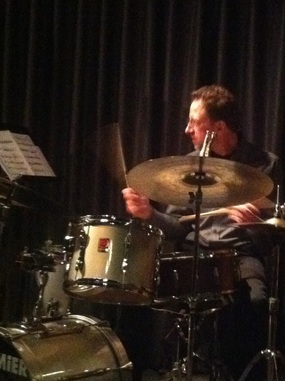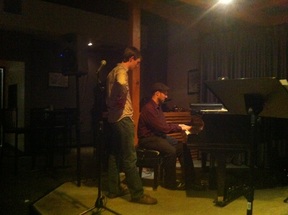
George Colligan had sat in on a couple of numbers with the Mike Prigodich Group earlier in the week and he was great fun to watch as he sight-read Chaos Theory, as very difficult original composition by Prigodich. He had also sat in on a song for Reinhardt Melz on the drums.
George had started his musical studies on drums and then switched to piano early on. He then studied classical trumpet at the Peabody Institute before becoming a faculty member at the Julliard School of Music. He is currently an Assistant Professor at Portland State University and is also a member of Jack DeJohnette's Quintet.
Ivories Jazz Lounge and Restaurant is a great place to experience jazz and it was the perfect seeting to enjoy this Quartet. We sat up close and were prepared to be impressed based on Mike and Reinhardt's recommendations. As things worked out, Mike and Reinhardt were soon in attendance. So was Paul Blow and a newcomer named Jordan Piper.
The opening number was Blue State, dedicated to the state of Oregon, an original composition by George Colligan. The song and the evening began with David Valdez on alto sax and out front. On bass, Eric Gruber kept up flowing lines that supported the piece very well. On drums, Todd Strait is the classic jazz drummer and nothing dergoatory is meant by that. George himself is eneregtic and free-wheeling. It became clear within the first three minutes that it was going to be a good night watching the interplay of these musicians. The balance between them was extraordinary and their support for each other exemplary.
The second piece, also an original, was entitled What Are You Looking At? Obviously, this is a refrain probably heard often in George's native New Jersey or nearby New York City. The song, like the usual intonation of the song's question itself, is loaded with attitude. Even the band members have the look of guys spoiling for a fight. With Eric maintaining a rather menacing bass approach, Todd has flippant hold on the sticks--almost backhanding the ride cymbal.

Then just that quickly, the mood switches to sweet and melancholy in the ballad called Missing. It was almost reminiscent of John Coltrane's Naima. The smooth solos continued the melancholy in such graceful ways. David Valdez' easy sax solo can only be described as haunting. Todd had no drum solo but the graceful slight swing added tremendously to the complete portrait of the piece.
Introducing the next piece, George explained that he usually preferred one-word titles. He recalled that Charles Mingus always had a propensity for longer titles. My personal favorite, a title loaded with bitter irony, was The Shoes of the Fisherman's Wife is Some JiveAss Slippers.
He explaned that the next song's title was based on one actresses' claim that she could imitate the various English dialects. Her New York accent was apparently found wanting, thus the title Miriam Edwards' New York Accent. The sound begins with Todd's hollow-sounding drum introduction which is joined by Eric's bass. The result is an aggressive, almost haughty, sound to the percussion. Introduced by big piano chords, David's smooth sax runs across the percussiveness coming from the piano-bass-drum combination. George switches back to playing alongside David. The piano becomes the pendulum in a cool back and forth that must be representative of Ms. Edwards' fluctuating accent.
The second set opened with Joe Jackson's 1982 hit Steppin' Out. George explained that there was no arrangement because of the original's "already jazzy character." David's alto sax took over the vocal part of the original. George translates the song so very well. His intuition is impeccable. Perhaps the most interesting element was watching Todd's responsive drumming. He listens and appropriately replies. Having toured with Eldar and Karrin Allison, Todd has mastered the measuring of shifting patterns and he is never caught behind.
Liam's Lament was an original piece dedicated to George's two year old son. George moves from piano to pianica for this. The introductory bass and drums supported the pianica and give way to its child-like quality. When the sax assumed the melody, George moved offstage to continue the chords. Eric's sweet solo was accompanied by Todd's very light brushwork. The ensemble resumed en masse to carry the piece to its conclusion.
Below is the link to the song's performance by George Colligan and Boris Kazlov. It does not have the movement of the quartet's rendition but it does relay the melody and the impact of the pianica.

So admirably, in fact, that he stayed on for a second number. George knocked Todd off of the drums for this number. He supported Jordan with the sensitivity of the pianist and Jordan's confidence began to show. At one point, Jordan briefly assumed musical direction and the audience approved. Jordan Piper--a name you might want to remember.
David Valdez sat out the next number, leaving the stage to George on piano, Eric on bass, and Todd back on drums. The delightfully surprising penultimate piece of the night was the Bealtes' Come Together by John Lennon. Being a Lennon fanatic, I almost leapt from my seat at the opening chords. It was here that Eric turned in his most impressive bass solo of the evening. It was sweeping and energetic and completely captivating. He has been favorably compared to Christian McBride and this was his moment to prove it. Impressive.
The final piece was based on the old jazz standard Lush Life and was entitled Enjoy It While It Lasts. It was a fitting reminder as the evening was coming to a close.
George Colligan has picked a fine alliance of musicians for the performance of his music. There is not a weak member in the whole quartet. Todd Strait is so well-suited to George's music and is entirely entertaining. Eric Gruber is a skilled and energetic bassist and often catches the listener by surprise. He ambushes the listener. There is a reason that David Valdez is a featured artist in George's quartet. He is cool and powerful, smooth and aggressive. In any list of Portland's best, all of these guys have to be ranked high.
Holding them all in his gravitational pull is George Colligan. He is light-hearted but dedicated, classic but innovative, skilled but inspired. Having moved to Portland in September of 2011, he is a remarkable addition to the city's musical tradition.
This must be one of the joys of performing in Portland; a vast array of up-and-comers alongside world-class musicians. Onstage or in the audience, performing or listening, musicians surround us. Seated next to Reinhardt Melz and Mike Prigodich while listening to George Colligan... lucky, lucky Portland.
 RSS Feed
RSS Feed
